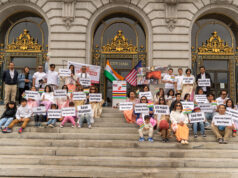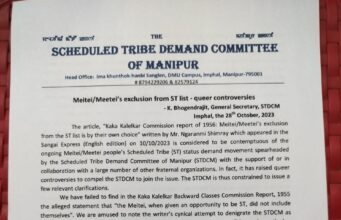MATHEMATICSTEACHING REDUCED TO ‘DOES’ & ‘DON’TS’
May 3, 2013IMPHAL: Mathematics teaching has been reduced to “does”and “don’t” without letting the students grasp a fuller understanding of theconcepts, said Huidrom Jayantkumar Singh, former head of department of Mathematics,D.M. College of Science and President, Manipur Mathematical Society.
Delivering his keynote address at aworkshop/seminar on Mathematics and ScienceCommunication for media personsorganised here today, he bemoaned that the faulty approach to teachingmathematics by focussing on problem-solving was responsible for maths phobiasuffered by students. This is one subject in which maximum number of studentsfails in the examinations. It is the most unpopular, rather most fear subjectamong students.
This media workshop was a part of the series being organizedacross the country by Vigyan Prasar, an autonomous body of the Ministry ofScience & Technology and the National Council for Science & TechnologyCommunication (NCSTC), Department of Science & Technology, Government ofIndia. Itis part of the activities of the National Mathematics Year (2012-13) being observedto mark the greatmathematician Srinivasa Ramanujan’s 125th birthanniversary.
Jayantkumar Singh said mathematicsteaching should pass through three stages. ‘Whats,’ that is, definitions,interrelation between principles, etc. ‘How” is the method of solving a problemor proving a proposition. “Why” is the interpretation and generalisations.Although the last stage does not provide solution to the problem, it is ofbasic importance because it tells us why a particular method of solving theproblem had been adopted. But teachers generally concentrate on the ‘how’ partand give little importance to the ‘what’ and ‘why’.
This, he said, forces student cramp up and learn byrote – just like mugging up English spellings and pronunciation. Hence, younglearners develop a distaste for mathematics. He said like taking scientificknowledge from textbooks and laboratories to the common people in the field,familiarisation with the principles of mathematics can be made lively byrelating them to our day-to-day activities.
 Giving his introductory remarks, Dr. Subodh Mahanti,senior scientists, Vigyan Prasar, said that the idea behind theseworkshop/seminars was to highlight the importance of mathematics inunderstanding the secrets of nature and solving practical problems, and to makepeople aware of India’s mathematical heritage. Mathematics is used as a universallanguage and tool for any
Giving his introductory remarks, Dr. Subodh Mahanti,senior scientists, Vigyan Prasar, said that the idea behind theseworkshop/seminars was to highlight the importance of mathematics inunderstanding the secrets of nature and solving practical problems, and to makepeople aware of India’s mathematical heritage. Mathematics is used as a universallanguage and tool for any
quantitative research in all the sciences. Fundamental mathematical questionsalso arise out of these research topics. And so we see the emergence ofdisciplines like mathematical biology, mathematical ecology, mathematicalgeography, mathematical physics, etc, Dr Mahanti pointed out.
The origins of mathematics, he said, can be tracedto antiquity. Prehistoric human beings probably learned to count at least up toten on their fingers. Ancient Indians, Chinese, Babylonians, and Egyptiansdevised methods of counting and measuring that were of practical importance intheir everyday lives. With the passage of time surveyors, clock and calendar
makers, masons and machine makers, and most importantly merchants, developedthe methods of counting and measuring. “We have a rich mathematical heritage.
One of India’s greatest contributions to mathematics is the number ‘zero’ andthe decimal system, which established the modern way of writing numbers,” headded.
Dr Mohanti said that during 2013 a number of activities are proposed to beundertaken under
a wide umbrella of initiatives called the International Year of Mathematics ofthe Planet Earth (MPE-2013). The idea behind MPE-2013 is to focus onmathematical research in areas of relevance to the various processes thataffect the Earth.
Nimish Kapoor, scientist with the Vigyan Prasar, said thatbesides producing films and radio programmes, publishing books on popularscience topics, Vigyan Prasar has been involved in different popularizationactivities. It has set up a networkof science clubs across the country and was involved in science and mathematicspopularization among school students and the common people. Speaking aboutscience and mathematics writing, he felt that science writers and journalistshould use simple language and avoid jargons when writing for lay audiences.
Others who spoke included Surendra Nath Singh,Director, Manipur Science & Technology Council (MASTEC), Prof. Roop ChandraSingh, head, department of biochemistry, Manipur University and wellknownscience writer and former principle, D. M. College of Science G. Toba Sharma.
Y.S. Gill
Master Resource Person
Veena
National Coordinator











